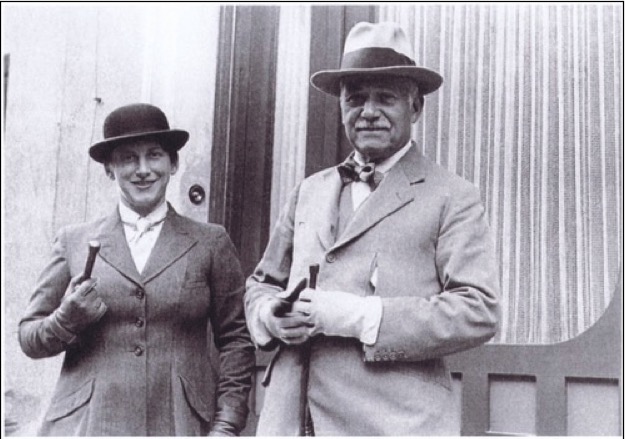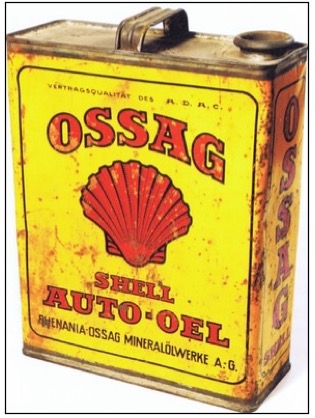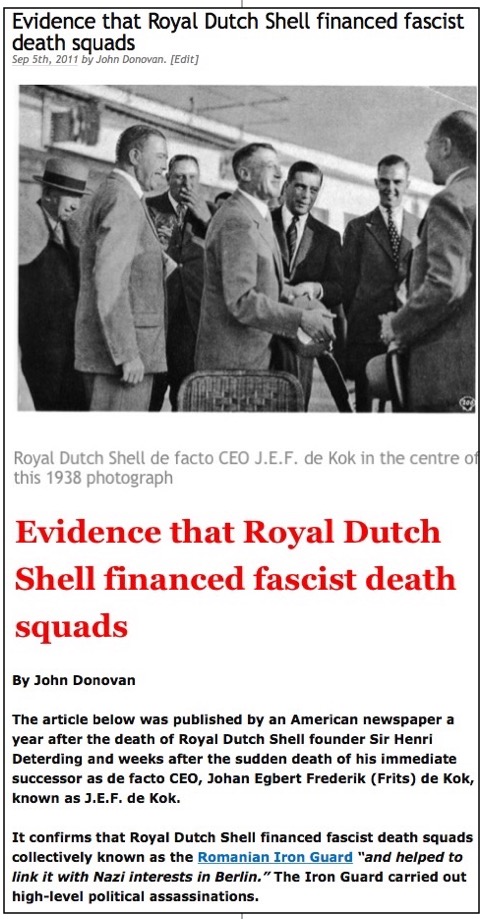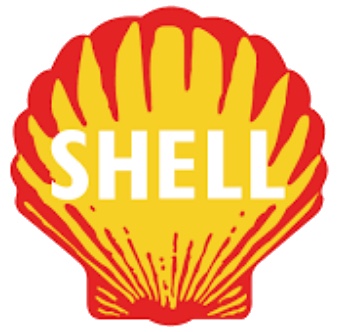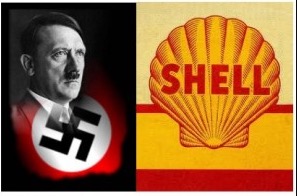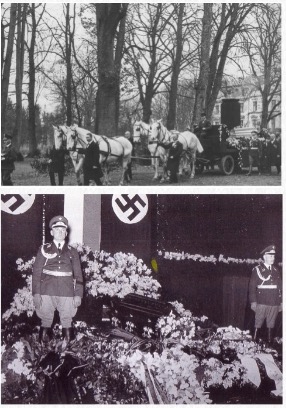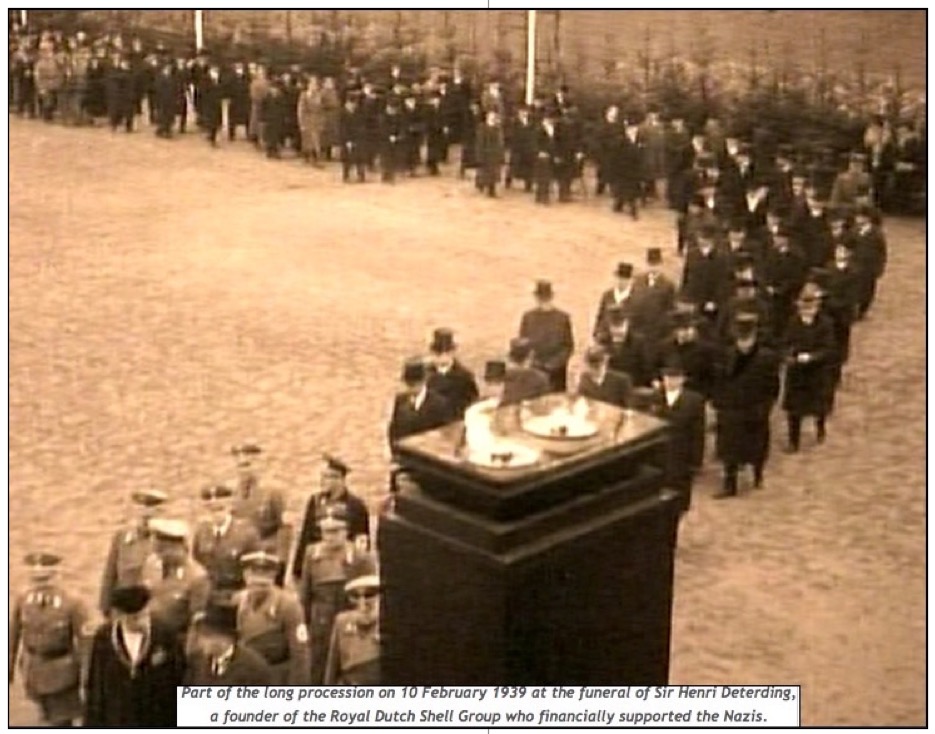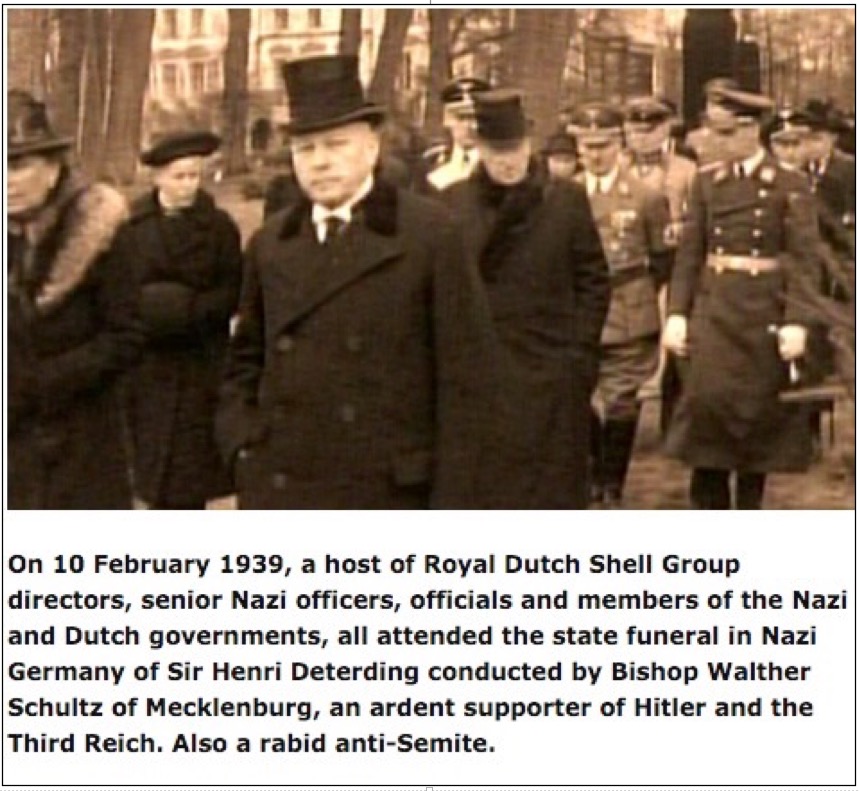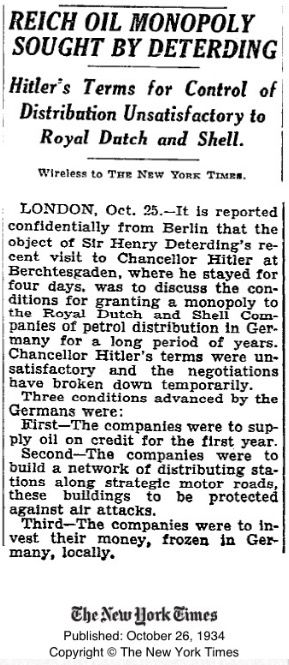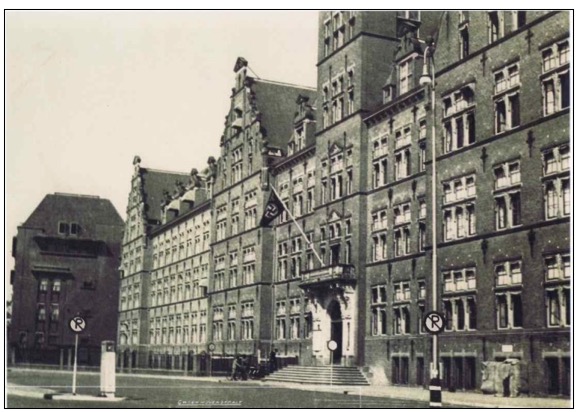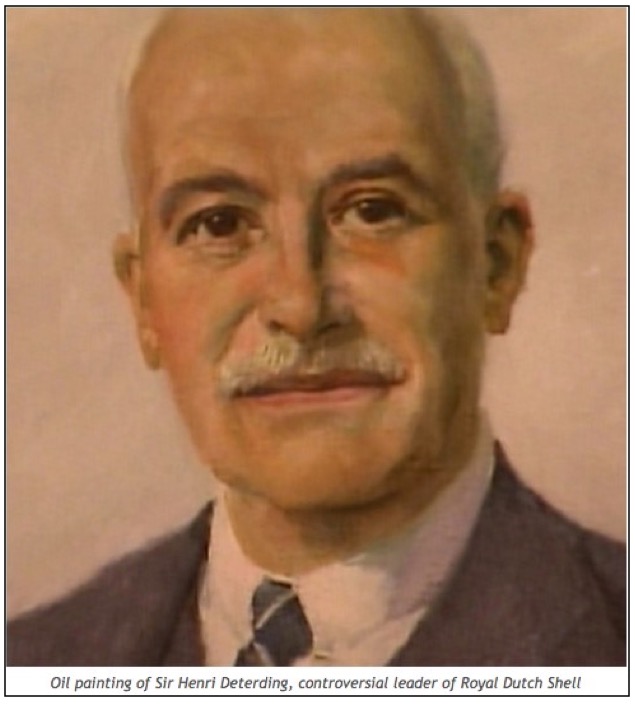The above photograph is of Sir Henri Deterding around the time of his retirement as absolute leader of the Royal Dutch Shell Group, standing alongside his third wife, a thirty-eight-year-old German-born ardent Nazi, Charlotte Knaack. Her admiration for the Nazis probably strengthened his views, and no doubt played a part in the decision to move their home to Germany.
In October 1936, the first news reports of the pending resignation of Sir Henri Deterding as the leader of Royal Dutch Shell Group were published.
The close relationship between Shell and the Nazis did not end with his retirement as leader of the Group on 31 December 1936.
From 20 December 1936, Deterding made widely reported multi-million dollar food donations to Nazi Germany. His colleagues were well aware of his activities but allowed him to remain as a director. This is unsurprising bearing in mind that Deterding held preference shares giving me a measure of control over Royal Dutch and, therefore, the Group.
Deterding was a director of several companies within the Group from 1 January 1937 until 4 February 1939, the day he died.
Shell continued its partnership with the Nazis after his death. The following is an extract from RDSH V1, where, immediately after referring to the funeral of Sir Henri on page 485, it says: –
“However, as we have seen above the Group continued to do business with Germany, drawing lube oil supplies, ordering tankers, expanding the Rhenania-Ossag installations, and participating in the Politz works.”
During 1937 and 1938, the lube oil production facility of Rhenania-Ossag – was expanded and modernized.
Anglo-Saxon, also part of the Royal Dutch Shell Group, had a total of seven large tankers built at German shipyards between 1935 and 1939, the largest number ordered outside the UK and the Netherlands during those years.
In August 1936, the Nazis announced a Four Year Plan to make Germany independent of foreign gasoline imports.
Initially, Royal Dutch Shell Group managers refused to allow Rhenania-Ossag to participate in the project, but by February 1937, just weeks after the retirement of Sir Henri as chief executive, the Group reversed the decision.
In other words, after the retirement of Sir Henri as leader of the Group, Shell decided to get even closer to the Nazis.
Royal Dutch Shell invested RM 27.5 million in the related “Politz” project involving consortium partners, Standard Oil of New Jersey and IG Farben, the giant German chemical company.
(Thirteen IG Farben executives were later imprisoned after being found guilty at the Nuremberg Trials of War Crimes.)
Shell was determined “at all costs” to conceal its involvement in the Politz project.
Extract:
“Because the Group wanted at all costs to avoid its commitment to a synthetic gasoline plant becoming public knowledge, two banks fronted as shareholders in Hydrierwerke Politz.” (Page 473 RDSH V1)
This startling admission of deliberate subterfuge comes not from some third party, but from Shell’s own archives. Shell was clearly well aware of the sensitivity of its continuing relationship with the Nazis.
The Politz project, which involved making aircraft gasoline, turned into what was described as “a devil’s pact” with soaring costs and construction delays. The Nazi government nonetheless demanded increased investment. Royal Dutch Shell Group initially refused to contribute.
In February 1939, the Group received an ultimatum from the Nazis: if Rhenania-Ossag did not take its full share in the increased costs, the government would view this as an infringement of the company’s duty to act in the interests of the German State, and would put the company into administration.
Dutch directors representing the Group capitulated and gave its German subsidiary Rhenania-Ossag permission to increase its financial commitment to the Politz project, which came on stream in 1940. See page 474 RDSH V1.
The importance of the Politz plant to the Nazis war machine and the horrific consequences cannot be overstated.
The following is a chilling extract from a webpage entitled “Politz Synthetic Oil Plant“ downloaded on 29 June 2019:
In 1937, near Pölitz (today Police in Poland), IG Farben built a large factory that would eventually produce 15% of Germany’s total consumption of synthetic fuel. Factory workers were forced labourers and over the next five years over 30,000 were employed thousand: whilst working there, 13,000 of them died of hunger and disease.
With this equally chilling description from a Wikipedia article downloaded on 29 June 2019:
Police, West Pomeranian Voivodeship – Wikipedia
In 1937, the synthetic fuel plant Hydrierwerke Pölitz AG was founded by IG Farben, Rhenania-Ossag, and Deutsch-Amerikanische Petroleum Gesellschaft[7] which by 1943 was producing 15% of Nazi Germany‘s synthetic fuels, 577,000 tons.[8] The plant derived its workforce from an adjacent system of camps (Pommernlager, Nordlager, Tobruklager, Wullenwever-Lager, Arbeitserziehungslager Hägerwelle, Dürrfeld Lager) plus a ship moored on the Oder River serving as a camp (Umschulungslager Bremerhaven). In addition, a subcamp of the Stutthof concentration camp was located in Pölitz.
In January 1940, a few months after the start of WW2, the Nazis took control of Rhenania-Ossag and consequentially Shell’s share in the already fully operational Politz venture. At least one senior manager, Robert Finn, who worked for Rhenania-Ossag before WW2 returned to Rhenania-Ossag after WW2, when control reverted to the Royal Dutch Shell Group. During the war, he was head of Third Riech oil supplies responsible for fuelling the entire Nazi war machine, machine guns, tanks, fighter planes, bombers, submarines, battleships etc. On his return, undeterred by his huge contribution to the crimes perpetrated by his Nazi masters, Shell made him a director of the Shell Chemical Company in Germany.
Royal Dutch Shell Group Dutch directors, Guss Kessler and Van Eck were directors of Rhenania-Ossag along with a Shell Chairman, Wilhelm Rudeloff.
Royal Dutch Shell Group directors Fritz De Kok and James De Booy were also involved in Rhenania-Ossag decision-making.
In 1938, a year after the retirement of Deterding as chief executive, Royal Dutch Shell had joined a consortium called Catalytic Research Associates (C.R.A.). IG Farben was also a member of that consortium. IG Farben used forced labor and held the patent on Zyklon-B gas used during the Holocaust to exterminate millions of people, including children.
Shell got into bed with what became the most notorious and evil company in corporate history, described in the 2008 book “Hell’s Cartel” as “a war monster.”
There is evidence that a year after the death of Sir Henri, Royal Dutch Shell financed fascist death squads collectively known as the Romanian Iron Guard “and helped to link it with Nazi interests in Berlin.”
The Iron Guard carried out high-level political assassinations. The extracts below are from an article published on 11 December 1940 by an American newspaper “The Evening Independent.” (Printed on page 18 – top, far right column.)
“GAMBLERS– The conflict between two vast oil empires–Standard and Dutch Shell–lies behind the internal turmoil that recently culminated in Rumanian riots, shootings and jailings–and an infiltration of Nazis into the harassed country in the Balkans. Oleaginous history simply repeated itself. The Royal Dutch Shell Oil company long headed by Henry Deterding and owned 50-50 by Dutch and British capital, is taking heavy punishment. Losses of extremely valuable oil properties in Russia transformed Deterding into a bitter anti-Bolshevik, and he labored for years to make Rumania a Fascist stronghold. His successor J. E. F. de Kok –who in turn passed on last month–financed the Rumanian “Iron Guard,” and helped to link it with Nazi interests in Berlin. Both groups played with Rumanian politicos and intriguers who looked after Shell’s health. They opposed King Carol, who had lined up with the French. Standard Oil likewise cast its lot with Paris, and stands to suffer unless it falls in with the Dutch Shell party line.
It is probable that neither Deterding nor De Kok contemplated or desired the political and international mess that the long-range scheming precipitated.
Both Shell and Standard will undoubtedly lose out in the end–as did the German and Italian industrials barons who financed and fostered their totalitarian masters, Hitler and ll duce.”
The article provides further evidence that Shell support for the Nazis continued long after the retirement of Deterding as leader of the oil giant in December 1936 and even after his death in February 1939.
The photo below is from an extensive Life magazine article published in February 1940. It shows Shell and Standard Oil (Esso) railway oil tank cars in Rumania bound for Hamburg and Wuppertal in Nazi Germany, five months after the outbreak of WW2. See Page18 RDSH V2.
Copyright Notice: All rights, including copyright and compilation in the content of shellnazihistory.com web pages authored by John Donovan are owned or controlled for these purposes by him. In accessing the said web pages, you agree that you may only download the content for your own personal non-commercial use. Except where expressly stated otherwise, you are not permitted to copy, broadcast, download, store (in any medium), transmit, show or play in public, adapt or change in any way the content of these web pages for any other purpose whatsoever without the prior written permission of John Donovan via the email address: john@shellnews.net
shellplc.website and its sister non-profit websites royaldutchshellplc.com, royaldutchshellgroup.com, shellenergy.website, shellnazihistory.com, royaldutchshell.website, johndonovan.website, shellnews.net and shell2004.com are owned by John Donovan. There is also a Wikipedia feature.